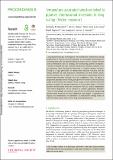Files in this item
Temperature-associated selection linked to putative chromosomal inversions in king scallop (Pecten maximus)
Item metadata
| dc.contributor.author | Hollenbeck, Christopher M. | |
| dc.contributor.author | Portnoy, David S. | |
| dc.contributor.author | Garcia de la serrana, Daniel | |
| dc.contributor.author | Magnesen, Thorolf | |
| dc.contributor.author | Matejusova, Iveta | |
| dc.contributor.author | Johnston, Ian A. | |
| dc.date.accessioned | 2022-11-14T10:30:23Z | |
| dc.date.available | 2022-11-14T10:30:23Z | |
| dc.date.issued | 2022-10-12 | |
| dc.identifier | 282141716 | |
| dc.identifier | b5b6e45a-1bcc-4ddf-887c-7c199a12ef76 | |
| dc.identifier | 85139573221 | |
| dc.identifier | 000868260200001 | |
| dc.identifier.citation | Hollenbeck , C M , Portnoy , D S , Garcia de la serrana , D , Magnesen , T , Matejusova , I & Johnston , I A 2022 , ' Temperature-associated selection linked to putative chromosomal inversions in king scallop ( Pecten maximus ) ' , Proceedings of the Royal Society of London Series B: Biological Sciences , vol. 289 , no. 1984 , 20221573 . https://doi.org/10.1098/rspb.2022.1573 | en |
| dc.identifier.issn | 0962-8452 | |
| dc.identifier.other | Jisc: 641101 | |
| dc.identifier.other | publisher-id: rspb20221573 | |
| dc.identifier.other | ORCID: /0000-0002-7796-5754/work/123196539 | |
| dc.identifier.uri | https://hdl.handle.net/10023/26386 | |
| dc.description | Funding: This study was initiated as part of the European Marine Biological Research Infrastructure Cluster (EMBRIC) project funded by the European Union's Horizon 2020 research and innovation programme under grant agreement no. 654008. | en |
| dc.description.abstract | The genomic landscape of divergence—the distribution of differences among populations or species across the genome—is increasingly characterized to understand the role that microevolutionary forces such as natural selection and recombination play in causing and maintaining genetic divergence. This line of inquiry has also revealed chromosome structure variation to be an important factor shaping the landscape of adaptive genetic variation. Owing to a high prevalence of chromosome structure variation and the strong pressure for local adaptation necessitated by their sessile nature, bivalve molluscs are an ideal taxon for exploring the relationship between chromosome structure variation and local adaptation. Here, we report a population genomic survey of king scallop (Pecten maximus) across its natural range in the northeastern Atlantic Ocean, using a recent chromosome-level genome assembly. We report the presence of at least three large (12–22 Mb), putative chromosomal inversions associated with sea surface temperature and whose frequencies are in contrast to neutral population structure. These results highlight a potentially large role for recombination-suppressing chromosomal inversions in local adaptation and suggest a hypothesis to explain the maintenance of differences in reproductive timing found at relatively small spatial scales across king scallop populations. | |
| dc.format.extent | 11 | |
| dc.format.extent | 1211449 | |
| dc.language.iso | eng | |
| dc.relation.ispartof | Proceedings of the Royal Society of London Series B: Biological Sciences | en |
| dc.subject | Evolution | en |
| dc.subject | Local adaptation | en |
| dc.subject | Chromosomal inversion | en |
| dc.subject | Population genomics | en |
| dc.subject | Molluscs | en |
| dc.subject | QH426 Genetics | en |
| dc.subject | DAS | en |
| dc.subject | NIS | en |
| dc.subject | MCC | en |
| dc.subject.lcc | QH426 | en |
| dc.title | Temperature-associated selection linked to putative chromosomal inversions in king scallop (Pecten maximus) | en |
| dc.type | Journal article | en |
| dc.contributor.sponsor | European Commission | en |
| dc.contributor.institution | University of St Andrews. Scottish Oceans Institute | en |
| dc.contributor.institution | University of St Andrews. School of Biology | en |
| dc.contributor.institution | University of St Andrews. Centre for Research into Ecological & Environmental Modelling | en |
| dc.contributor.institution | University of St Andrews. Marine Alliance for Science & Technology Scotland | en |
| dc.identifier.doi | 10.1098/rspb.2022.1573 | |
| dc.description.status | Peer reviewed | en |
| dc.identifier.grantnumber | 654008 | en |
This item appears in the following Collection(s)
Items in the St Andrews Research Repository are protected by copyright, with all rights reserved, unless otherwise indicated.

